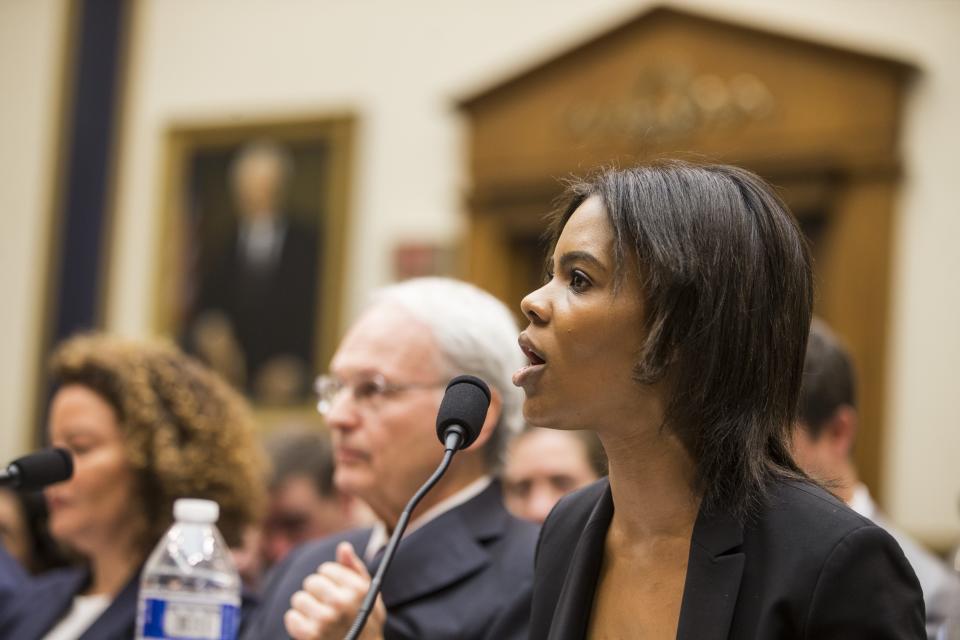Progressives push to cancel conservatives. Here's how the right is fighting back.
We live in an age of social sanction. Perhaps every age is to a degree. But the predominating social sanction (or “cancel culture” if you like) from the American left as it expresses itself in popular culture and the activist activation of major American institutions are yielding a soft secessionism from the American right.
Cancel culture, whether one generally supports or opposes it, has been well discussed. But within the worrisome rise of existential polarization in American life, the latter phenomenon also deserves attention.
Cultural right is pulling away from mainstream society
An impulse toward secession has always been a part of the American character. We ought not look at it as an absolutely pejorative term. The United States was founded, after all, in secession from the British Empire.
Hard secession, of course, also led to the Civil War in a contest between the interests of slavery and the interests of the Union – one that wound up destroying the former before nearly destroying the latter.
Since then there have been no truly serious efforts toward large-scale secession, though in more recent years there have been minor efforts. A small but stubborn secessionist movement on behalf of Texas popped up in the Lone Star State in the 1990s and still seems to continue.
Opinions in your inbox: Get exclusive access to our columnists and the best of our columns every day
For unique historical reasons, secessionism has particular roots in Texas, but perhaps one could argue that the only (briefly) successful secessionist enterprise came about in liberal Seattle during the separation declared by activists during the summer of protest after the police murder of George Floyd. This established what came to be known as the Capitol Hill Autonomous Zone. That unsettling uprising soon subsided.
Supreme Court drafts do not leak: Abortion may be at risk, but so is court's sanctity
What faces us today is a swelling movement toward "soft secession," and it is overwhelmingly a phenomenon of the political right. Jeff Deist, president of the Mises Institute (a libertarian think tank), uses this phrase to advocate what he describes as “a counterrevolution within the form: aggressive federalism, regionalism, localism, and an aggressive subsidiarity principle, operating in de facto opposition to the federal state – or at least sidestepping it.”
This includes acts of “direct nullification or flouting of federal edicts” whether in the enforcement of vaccine mandates or other directives of the state. One could also apply that to resistance to international governing acts, such as climate change commitments and United Nations decisions thought to bind the American people.
There’s a long history to the idea of nullification (deeply interwoven with efforts to resist the implementation of civil rights, particularly in the South, though I do not seek to racialize or regionalize the matter here).
Obama wrote about countercultural movement
In the legal sense then, there is a long history to soft secessionism. What I also mean by this phrase is a deliberate, but selective, effort to divorce major portions of the body politic away from the cultural influence of mainstream institutional society. For this there is a longer history too, particularly surrounding efforts to preserve evangelical Christian culture from the massing influence of liberal political and popular culture.
Barack Obama wrote about this history in "The Audacity of Hope," describing a countercultural revolution that picked up speed in the 1960s, producing a flourishing of evangelical radio, revivals, television and universities, “all of which allowed the devout to ignore the popular culture as surely as they were being ignored.”
A huge amount of loss: 5 lessons from COVID we must learn after losing 1 million people in America
Perhaps the difference today in part is that people on the right do not feel they are being ignored by the progressive mainstream so much as actively hounded and harassed by it. Right-leaning libertarians and social conservatives differ somewhat in the degree to which their responses to this emphasizes legal resistance to left-wing social sanction, in the name of liberty, versus cultural resistance, in the name of protecting the social strength of conservative Christianity and the traditional family.
One hears these views in discussions involving my friend Dave Rubin, a self-described “classical liberal” and staunch defender of free speech, and Yoram Hazony, a leading voice for “national conservatism." Hazony explained to Rubin in a recent conversation that “the problem is … human beings do not only need freedom by nature. … Human beings need to be constrained.”
By this, Hazony means that people need the guardrails and structures provided by religion to avert chaos, the very chaos both he and Rubin see as pushed upon us by the left.
For conservatives, libertarians and even a number of moderate liberals, this push reveals itself not just in the perceived insistence upon centering discourse over sexuality in schools leading to measures like Florida’s Parental Rights in Education Act (better known as the “Don’t Say Gay" bill) but also in political condemnation of conservative legislation by leading corporations.
Worse than Trump: How Biden bungled the job of leading America's economy
In the past, major corporations could be relied upon to be at least outwardly neutral on matters of politics. Their role was to provide goods and services for their customers and to turn a profit for their shareholders, not to polarize the American people by weighing into politics. But the recent battles between Disney and Florida Gov. Ron DeSantis over the education bill shows that the era of corporate neutrality is behind us, lending urgency to the feeling among many on the right that it is open season on conservatives.
Progressive activists have pushed corporations and many other institutions out of their traditionally neutral postures, and for reasons of deep conviction. The host of "Last Week Tonight with John Oliver," firmly believing that the effect of the Florida legislation will be to marginalize LGBTQ parents, teachers and children, points out that Disney gave $50,000 in donations to DeSantis and supported other backers of the bill in the Florida Legislature over the past two years, and has a moral obligation to fix the damage it has done.
Oliver said: “Marginalized creators have made billions of dollars for Disney,” which took this long to realize the company shouldn’t take that money and use it to “actively undermine those creators’ interests.”
But in response to the political awakening activated by progressives within institutions, libertarians and conservatives are responding by developing their own ecosystems of cultural separation while also fighting back in the courts.
No one has brought these two camps, or these two approaches, together more effectively than has The Daily Wire, founded by writer and commentator Ben Shapiro and business partner Jeremy Boreing.
Amassing an audience of millions through bold branding, polished podcast production, and charismatic and controversial personalities delivering a widely resonant message on the right, The Daily Wire has diversified its efforts in remarkable ways. Shapiro and Boreing have galvanized their following by suing the Biden administration over matters such as vaccine mandates while also launching high-powered, full-length feature films showcasing conservative values in entertaining fashion. They are even launching a children’s network called DW Kids to compete directly with content offered by Disney.
Progressives have every right to push back against people and institutions they consider to be in positions of influence just as conservatives have every right to respond in the courts and in the media, and to build their own cultural spaces. But for all things there is a price to be paid.
Another version of this is something called the "Benedict Option," advanced by author Rod Dreher, calling for Christians to disengage from popular society to establish social islands within the United States where conservative Christian values can thrive.
This idea was inspired in part by the thinking of Alasdair MacIntyre, a famed philosopher who said we are waiting for a new Saint Benedict – the 5th century monk known in part for establishing a ministerial order that preserved an austere lifestyle of piety and devotion.

But MacIntyre rejects the Benedict Option, saying that “we need a new kind of engagement with the social order, not any kind of withdrawal from it.”
Are we trying to destroy America?: Donald Trump and Tucker Carlson vs. Ronald Reagan and George H.W. Bush
MacIntyre’s own hero among philosophers was the great African American journalist Albert Murray, author of "The Omni-Americans." MacIntyre has upheld Murray’s thesis as his own, stating that “you aren’t really an American unless you realize that with part of yourself you’re a New England Yankee, with part of yourself you’re a Midwesterner … and with part of yourself you’re an African American. And unless you understand the relationship between these you won’t understand what it is to be an American.”
The danger that comes from the social sanction of the left and the soft secessionism of the right is that in our efforts to ostracize others and remove ourselves from one another, we will abandon any efforts to call to mind what we have in common as Americans.

We share a greater history that need not make us aliens to each other. The work of groups such as the New Pluralists, the Listen First Coalition and Braver Angels (for which I work) set forth the infrastructure by which we can prevent the cultural dissolution of the union.
But that is a column for another day.
John Wood Jr. is a columnist for USA TODAY Opinion. He is national ambassador for Braver Angels, a former nominee for Congress, former vice chairman of the Republican Party of Los Angeles County, musical artist, and a noted writer and speaker on subjects including racial and political reconciliation. Follow him on Twitter: @JohnRWoodJr
You can read diverse opinions from our Board of Contributors and other writers on the Opinion front page, on Twitter @usatodayopinion and in our daily Opinion newsletter. To respond to a column, submit a comment to letters@usatoday.com.
This article originally appeared on USA TODAY: Cancel culture has Republicans fighting against Democrat harassment.

